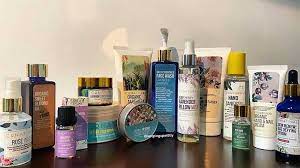F.P. Report
ISLAMABAD: The global skincare industry over the years is captured by France, South Korea, United States and Germany, taking a major chunk of the overall revenue generated through synthetic beauty products.
Germany, France, Italy and the United Kingdom have occupied 80 percent of the European natural and organic personal care products market.
The global personal care active ingredients market size is reportedly US$ two billion with China leading the East Asian market having US$ 123 million share by 2022.
Though the skincare industry is booming worldwide, the Pakistani counterpart isn’t far behind in the race with local natural and organic products not only gaining foothold in the country but also attracting global consumers.
“The reasons behind popularity of the organic personal care products is growing public awareness on the significance of natural products and people don’t want to compromise on health,” said Dr Ashraf Wani, an Economy expert.
Women in Pakistan, specifically, are more concerned about their skin and skin-related issues, including acne, wrinkles, and sunburn.
Dr Wani said that growing skin care problems were the force behind popularity of these organic and natural products as “the local industry unfortunately is flooded with synthetic substandard beauty products sans quality monitoring from the relevant authorities.”
With climate change and pollution, the risk of skin diseases has worsened, leading many brands to look for producing skincare solutions sustainably.
“Organic products are devoid of any harmful chemicals and are a more safe and healthy option for the environment, and they don’t pollute groundwater,” Co-founder and Director Conatural, Rema Taseer explained.
Conatural, co-founded seven years back by Rema and her sister Myra, is among a variety of companies, including SkinDeepIntl, Kishmish organic skincare, Aura, Lush Organix that sprung up in Pakistan for providing organic and authentic skincare to the public. T
hese brands primarily use social media, specifically Instagram and TikTok for the promotion of their products and reaching customers, majority of whom rely on brands’ official websites to avoid fake sellers.
This practice also helps companies in gaining public trust and driving sales.
Makeup enthusiast from Islamabad Aniee said that she never opts to buy skincare items from brands without an official website because, in her opinion, those with official websites are more reliable than those who don’t.
Minimum price of organic skincare items starts from Rs 2,500 and goes up to more than Rs 8,000 per product, she added.
Even though these organic elixirs are good for the environment and skin, nonetheless they are not suited for everyone’s pocket.
Another consumer Ambreen Ali said people buy expensive products thinking “they are more effective”.
There was a need to create awareness about the possibility that less costly skincare products can also be as good or even better than high-priced ones, she added.
An online survey conducted with around 50 participants revealed that mostly females purchase skincare products. Women of 25-40 years of age are more likely to try skincare items, with most relying on online customer reviews.
Majority of the respondents are satisfied with their brand of choice giving an 80% score.
However, very few consult a skin specialist or beautician before making a purchase while most set a specific monthly budget for their daily skincare regime and confirm authenticity through reviews or testing.
Beautician Kiran said that skincare brands can be useful to protect skin, adding that many clients consult her before buying such products.
Whereas, Dr Uzma, a dermatologist in Islamabad, said she recommends medicated skincare products. It would take time for local organic skincare products to be suggested by doctors because “we don’t have substantial data on effectiveness of such products”, she added.
According to Statista, the Skincare segment in Pakistan is valued at US$ 709.70m in 2022 and is expected to grow annually by 2.58% (CAGR 2022-2026).
The data further shows that the majority of revenue share (70%) is of facial products, followed by body care solutions.
Dr Ashraf Wani predicted exponential growth in the local skincare industry if “it gains public trust”. He said the growing trend of seeking natural and organic solutions could see more brands enter the skincare arena and generate more business activities and employment opportunities thereby increasing revenue and decreasing dependence on foreign brands.
Rema saw enormous potential for the industry to flourish in Pakistan.
“The most important factor which can add to local industry’s growth is more awareness to make people realise the harmful effects of using substandard and synthetic ingredients,” she concluded. (APP)







